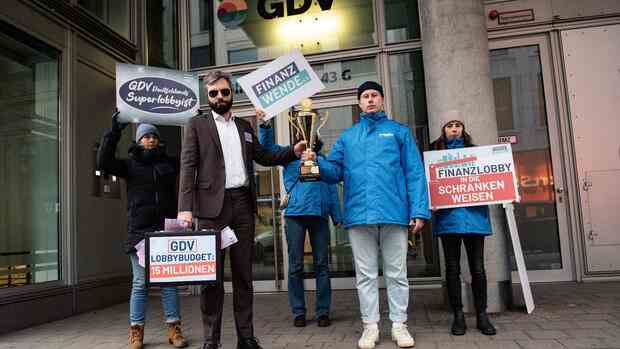Professional lobbyists have to register on the website of the German Bundestag.
(Photo: IMAGO/aal.photo)
Berlin The traffic light parties are striving to reform the lobby register with the aim of freeing non-profit organizations from certain transparency obligations. “It cannot be the goal of a lobby register that, for example, donations to the Red Cross for earthquake victims have to be disclosed with the name and address of the donor,” said the parliamentary director of the FDP parliamentary group, Stephan Thomae, the Handelsblatt. “To address this issue, we are exploring options such as an exemption from disclosure requirements for charitable donations or the possibility of anonymization.”
The SPD also sees an urgent need for action. Associations such as the German Life Saving Society (DLRG) or Caritas “fear a massive drop in donations if private donors have to give their names, which can then be read on the Internet,” said the parliamentary director of the SPD parliamentary group, Johannes Fechner. the Handelsblatt. “That’s why we are deliberating on regulations that protect the anonymity of private donations to charities.”
The Greens member of the Bundestag, Bruno Hönel, spoke of “legitimate and understandable problem reports” from non-profit organizations. “We take the concerns seriously and are examining possible regulations to solve these problems with an open mind.”
The Lobby Register Act came into force on January 1, 2022. Since then, professional lobbyists have had to enter a register on the German Bundestag’s website. This should make it clear who wants to influence political decisions and legislation.
Among other things, the lobbyists must provide information about their clients and subject areas as well as the personnel and financial costs of their lobbying activities in the Bundestag and the Federal Government. They are obliged to adhere to a specified code of conduct. Violations of this can result in a fine of up to 50,000 euros.
Union warns: NGOs are not “good lobbyists” per se
The law also requires information on the funding of lobbyists. For example, the names of donors and the value of the respective donation must be disclosed in the lobby register if the legal threshold of 20,000 euros is exceeded individually or in total. In the case of donors who do not want this, organizations would then either have to refuse to accept the donation or give up the representation of interests that is subject to registration.
>> Read also: Gas industry fights for influence – 40 million euros for lobbying
There has already been a lot of criticism of this regulation. Timo Lange from the Lobbycontrol association recently emphasized that the lobby register should not contribute to a reduction in donations, for example for humanitarian aid in Ukraine. Donations could have a relevant influence on the political work of an organization and therefore a certain degree of transparency is also important here.
“But at the same time, the impact of a single €20,000 donation to an aid organization that collects many millions of euros in donations should be extremely small,” he said. “Especially since in such cases, the donations are used to finance aid projects and not political work.” In this respect, it is “understandable that wealthy people who donate for such purposes do not expect their names to suddenly appear in the official lobby register of the Bundestag and federal government”.
The Union rejects the traffic light plans. “It’s not about small donations for charitable purposes, but about large donations of more than 20,000 euros a year, which can sometimes be six or seven figures,” said parliamentary group manager Patrick Schnieder (CDU) to the Handelsblatt. There is a “considerable lack of transparency” in this area.
Apparently, the traffic light is based on the “erroneous assumption” that non-governmental organizations (NGOs) are “good lobbyists” per se. However, NGOs could also hide economic or even interests of foreign states that finance the organizations with donations and thus exert influence. “According to the traffic light plans, these influences would no longer be recognizable in the future,” warned Schnieder.
More: Gazprom, Lukoil, Kaspersky: How the EU leadership wants to sanction Russia lobbyists in Brussels
